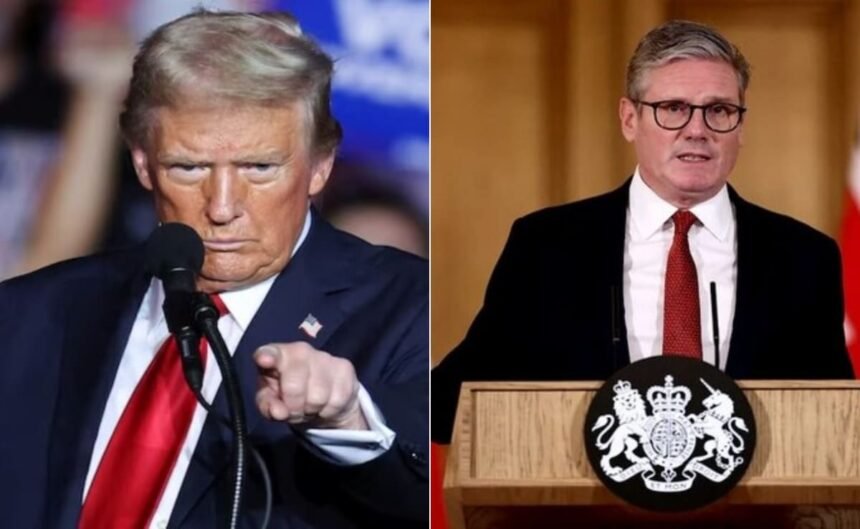Keir Starmer insists the UK-US special relationship will “thrive” under Donald Trump, but the Prime Minister’s Labor government has multiple reasons to fear a resurgence of the Republican president.
A possible trade war, disrespectful comments about Trump from Labor ministers and any role for Starmer critic Elon Musk in the Trump administration will make for a bumpy road for the allies.
Britain’s “die-hard” support for Ukraine’s war against Russian aggression and its “unwavering commitment” to the NATO military alliance are also likely to be key points of contention, experts said.
Starmer took the first step on Wednesday night by calling Trump to congratulate him, telling reporters at a European summit in Budapest on Thursday that the call was “very positive, very constructive”.
But Richard Whitman, professor of international relations at the University of Kent, said the center-left government in London would be “nervous” about Trump returning to the White House.
“Most of the broad parameters of British foreign policy are set by responding to the main concerns of the United States,” he told AFP, citing doubts about Trump’s commitment to Ukraine and Nato.
Britain has been one of Ukraine’s biggest financial and military supporters since Russia launched a full-scale invasion of the country in February 2022, and any shift in Trump’s policy would put the country at a disadvantage.
“(Britain) can’t do a 180 on Ukraine because it’s invested too much,” Whitman said.
Simon Fraser, the UK’s former top civil servant, added that Trump’s approach to the EU and whether it would include imposing tariffs on allies could complicate UK-US relations.
Trump has threatened to impose tariffs of up to 20% on all U.S. imports and up to 60% on Chinese goods.
economic unpredictability
The trade war between Trump and the EU could put the UK in trouble.
Global economic volatility will hamper Starmer’s pledge to boost Britain’s flagging economy.
The National Institute of Economic and Social Research, a leading think tank, has warned that Trump’s tariff plans could halve UK economic growth over the next two years, pushing up prices and interest rates.
Lindsay James, investment strategist at Quilter Investors, said that “any (UK-US) trade agreement negotiations are unlikely to resume” after Trump is elected president.
“Britain has no obvious bargaining chip,” she added.
Labor has historically had close ties with the Democratic Party, and several senior figures attended the party’s convention in Chicago in July when Kamala Harris was named the Democratic presidential candidate.
Last month, Trump accused Starmer’s government of “blatant foreign interference” in the US election over the visit and Labor staff campaigning for Harris.
Behind the scenes, Labor has been trying to build bridges with the Trump team in recent months, with Starmer having a two-hour dinner with Trump in September.
However, previous comments by senior Labor figures could make the deal awkward for both parties, particularly Foreign Secretary David Lammy, who in 2018 called Trump a “misogynistic sociopath with neo-Nazi sympathies” “The tyrant” and “The wigged tyrant”.
Senior British minister Pat McFadden said on Thursday that Trump was “a fan of Britain” and that Starmer’s face-to-face meeting with him had been “productive”.
“I think ultimately, these shared values and interests are more important than a few tweets from years ago,” he said. “You can rise above these things.”
No plan B
Starmer’s political spokesman insisted on Wednesday that Lamy would remain in office for the full five-year parliamentary term.
But trouble could also come from Trump supporter and tech billionaire Musk, who was rebuked by ministers this summer for claiming that far-right riots across England would lead to “civil war”.
Britain and the United States may also be at odds on climate issues, with Trump claiming to be a climate change skeptic and Labor determined to make Britain a “clean energy superpower.”
Analysts point out that this special relationship established during World War II has lasted 80 years, despite multiple governments with different positions on both sides of the Atlantic.
“Political disagreements at high levels do not mean that the entire relationship is fragile. There are checks and balances,” Fraser said, citing the “institutional structure.”
Whitman agreed it would continue, but added: “If it doesn’t, then a huge pillar of British foreign and security policy will collapse.
“If you put that together with what has happened (leaving) the EU, then the UK is really adrift.
“The UK has no hedging strategy. It has no backup plan for its relationship with the United States.”
(Except for the headline, this story has not been edited by NDTV staff and is published from a syndicated feed.)

